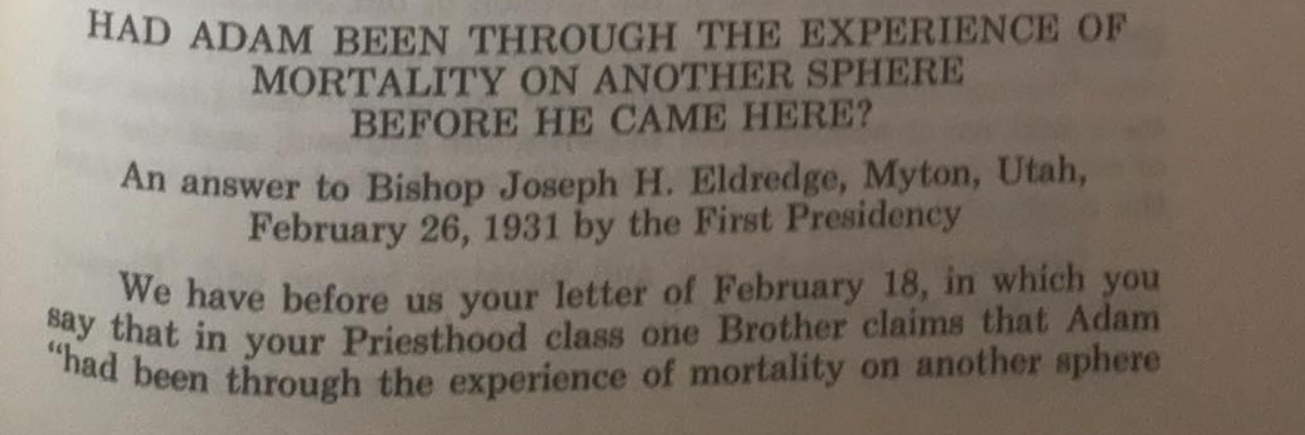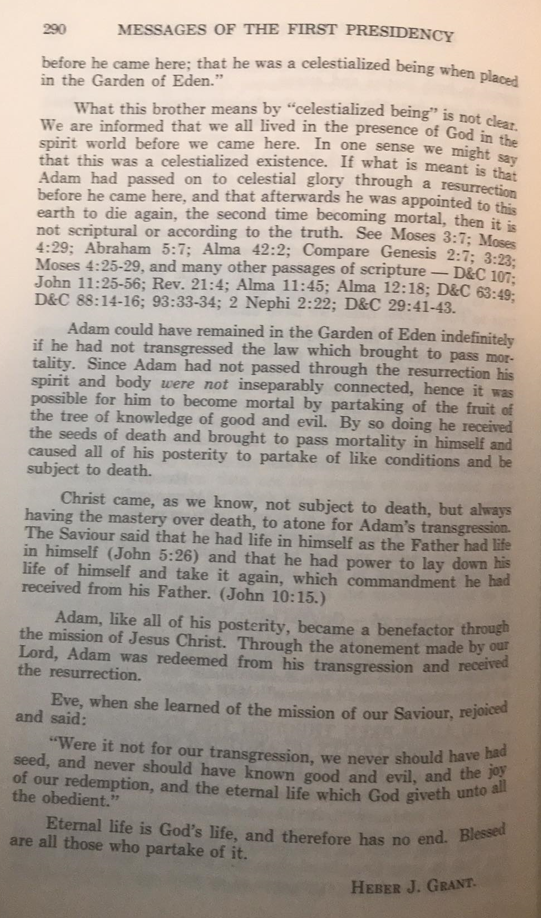Heber J. Grant writes that Adam was not resurrected when he entered the Garden.
- Type
- Book
- Hearsay
- Reprint
- Reference
Heber J. Grant, "Adam's status in the Garden of Eden," February 26, 1931 in Messages of the First Presidency, comp. James R. Clark, 6 vols. (Salt Lake City: Bookcraft, 1971): 5:289-90
- Scribe/Publisher
- Bookcraft
- Audience
- Reading Public, Members of The Church of Jesus Christ of Latter-day Saints
- Transcription
An answer to Bishop Joseph H. Eldredge, Myton, Utah,
February 26, 1931 by the First Presidency
We have before us your letter of February 18, in which you say that in your Priesthood class one Brother claims that Adam "had been through the experience of mortality on another sphere before he came here; that he was a celestialized being when placed in the Garden of Eden."
What this brother means by "celestialized being" is not clear. We are informed that we all lived in the presence of God in the spirit world before we came here. In one sense we might say that this was a celestialized existence. If what is meant is that Adam had passed on to celestial glory through a resurrection before he came here, and that afterwards he was appointed to this earth to die again, the second time becoming mortal, then it is not scriptural or according to the truth. See Moses 3:7; Moses 4:29; Abraham 5:7; Alma 42:2; Compare Genesis 2:7; 3:23; Moses 4:25-29, and many other passages of scripture-D&C 107; John 11:25-56; Rev. 21:4; Alma 11:45; Alma 12:18; D&C 63:49; D&C 88:14-16; 93:33-34; 2 Nephi 2:22; D&C 29:41-43.
Adam could have remained in the Garden of Eden indefinitely if he had not transgressed the law which brought to pass mortality. Since Adam had not passed through the resurrection his spirit and body were not inseparably connected, hence it was possible for him to become mortal by partaking of the fruit of the tree of knowledge of good and evil. By so doing he received the seeds of death and brought to pass mortality in himself and caused all of his posterity to partake of like conditions and be subject to death.
Christ came, as we know, not subject to death, but always having the mastery over death, to atone for Adam's transgression. The Saviour said that he had life in himself as the Father had life in himself (John 5:26) and that he had power to lay down his life of himself and take it again, which commandment he had received from his Father. (John 10:15.)
Adam, like all of his posterity, became a benefactor through the mission of Jesus Christ. Through the atonement made by our Lord, Adam was redeemed from his transgression and received the resurrection.
Eve, when she learned of the mission of our Saviour, rejoiced and said:
"Were it not for our transgression, we never should have had seed, and never should have known good and evil, and the joy of our redemption, and the eternal life which God giveth unto all the obedient."
Eternal life is God's life, and therefore has no end. Blessed are all those who partake of it.
HEBER J. GRANT.
- Citations in Mormonr Qnas
The B. H. Roberts Foundation is not owned by, operated by, or affiliated with the Church of Jesus Christ of Latter-day Saints.


